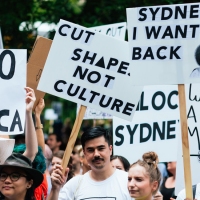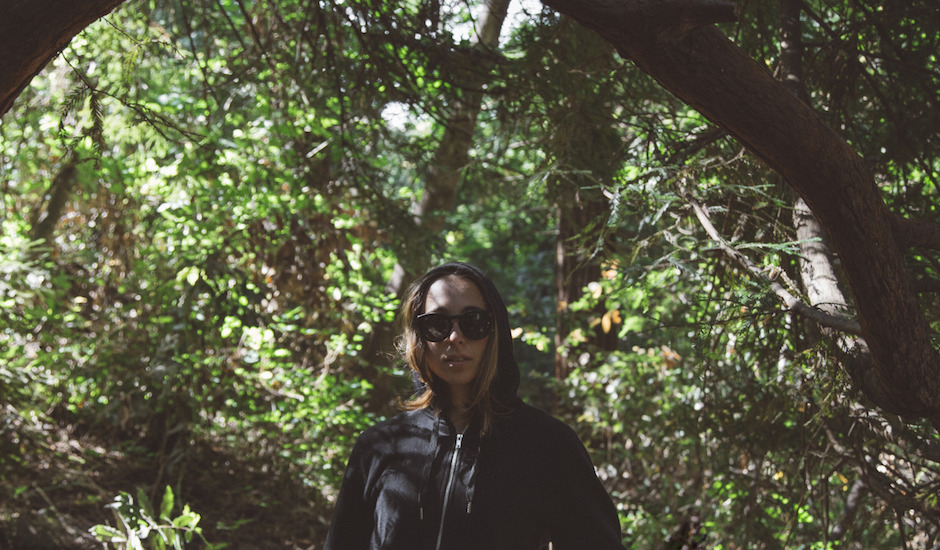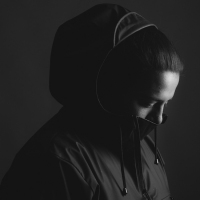 'You're not my real mum, Mike' - spending a day at the Keep Sydney Open Rally15,000+ people went for a walk through Sydney last weekend to try and get their city back.
'You're not my real mum, Mike' - spending a day at the Keep Sydney Open Rally15,000+ people went for a walk through Sydney last weekend to try and get their city back.

Five Minutes With Zena Loxton (Emergence Creative Festival)
Loxton will be in Western Australia soon as a keynote speaker for Emergence Creative Festival.
Header image by Reginald Van Nurden.
Zena Loxton is the founder of Dharma Creative, a new creative agency specialising in ideas for people and the planet - a role that follows on from her time as Creative Director at the VICE headquarters in NYC. Loxton was born and raised over here in little ole Perth, before taking off overseas to pursue a career in the creative fields. Loxton's work at VICE covered documentary storytelling, advertising, art and fashion, music videos, and television show development, most recently launching VICE's Live Nation Channel. She'll be covering all this and more when she takes on a Keynote Speaker role at the upcoming Emergence Creative Festival, and we caught up with her to learn a little more about her career in the creative industries.
We're linking up with the team behind Emergence Creative Festival to shine the light on their upcoming event, taking place for the third time down in Margaret River, WA March 16-19. Head to the WEBSITE and/or FACEBOOK for more info.

To go from being a local Perth-girl to the Creative Director at VICE HQ in NYC is a huge journey; can you give us a little insight into that trajectory?
I come from a family of trailblazers, nomads and true blue Aussies, travel and adventure is in our blood. As soon as I hit 18 I was out of Perth, and moved to London, which when I look back on it now is completely nuts, unskilled and with £3 to the dollar pretty risky. But you know how it is, you just go with your gut, and I knew I wanted more than I could find in Perth at that time.
While I was sharing a room in a house of 10 people, the classic Aussie backpacker experience, I got drunk at lunch one day and got a job working in a bar called Momo’s in Mayfair, that completely opened up my experience of the world. It had membership by invitation only, and the owner pretty much exclusively invited artists and creatives to join.
At Momo I was surrounded five nights a week by the most successful, interesting, creatives of ‘cool Brittania’ at that time, who would all ask me what I did outside of being a cocktail waitress… which forced me to really think about who I wanted to be in the eyes of those people. By meeting them, I realised you could have a creative career, and a lot of fun doing it. And that changed my life.
After that I just went for it, worked hard and believed in what I was doing at whatever level I was at at the time. I have been lucky to meet incredible people along the way, and make loads of amazing work, but I think you’ve got to have that core inside of you, that drive that believes in creativity as a medium for exploring the human condition, so you keep going.
Now looking back, I can’t imagine living any other way.
Why did you decide to pursue a profession in the creative industry, which can be a highly competitive and sometimes difficult area to break into?
I grew up taking photos on my dad’s camera, won some school competition somewhere along the way, did acting classes, modeling, painting, anything I could get access to, I was always in galleries and at gigs or the cinema, I just loved it all. Then I did a film production course and something clicked, everything was in one place, picture, sound, performance… and I was hooked. This was a business I could sink my teeth in to.
I’m the kind of person that once I make up my mind, whatever I’ve decided is happening, there’s no room for a safety net. I didn’t give myself the option to bail out, it was my passion and I went for it. I’m living proof that belligerent belief in an idea can make it happen if you work hard enough.
You’ve worked in so many media domains; TV, film, music, advertising; what have you learnt from working in these different areas over the years?
I think this is the natural path of the artist, the medium is part of the story, and you want to try them all out to see how you can play with ideas in a new way. For example, Picasso’s sculptures are my favorite work of his, but he is known more for his painting. I see something in those sculptures that is so perfectly him, that I can’t get in the paintings and I love it.
Professionally, they all work together, one medium makes you stronger in the other. Like now, I’m writing a TV show, and I can use all of the advertising experience to give it the best chance of being sold, and people watching it. And relationships with musicians, and understanding music, is so important to every film you make be it documentary, or fiction. And so on.
What are some of the similarities or differences between them all, or are they all interconnected in a way?
The industries are different, they all have different rules - Hollywood is Hollywood, and the music industry has music industry quirks. You’ve got to know how to navigate them with the subtleties of their own nature. Ultimately they have similar goals, but flipping between them is mostly knowing how to communicate your idea to that specific group of people that will determine the success or failure of a project. Especially when it’s a hybrid idea being executed across platforms and industries.
The video clip for Abbe May's Design Desire, directed and edited by Loxton.
Given your experience and insight, what are some things you could tell us that the average person would not necessarily know about the creative industry, and what will you be covering at Emergence?
The main thing to know about the creative industry, is you need to learn the rules, and then systematically break them.
At Emergence I’ll be talking about how going against the accepted path, can often bear the most delicious fruit. I’ve called it Going The Wrong Way, For The Right Reasons. It’s reflected in my process, I always want to try the new technology or a different way of making something, that has never been done before. That’s far more exciting to me than making another ‘X’, no matter how crafted it is, I get bored eventually.
You’ve worked on big multi-media campaigns and platforms, how have these rapid changes in technology changed your job and the creative industry you work in?
One of the producers who taught me the most, was my boss in the mid-naughties when digital had just started to pick up, around the time Facebook became a thing everyone used. He was, and still is, an amazing classical ad producer, who works with the best people and always delivers great work. When I would get all hyped up about digital stuff, he would turn to me and say, "Well, they’re still going to need to make good films to put on the internet aren’t they?" and he was right.
So when digital kicked off, I saw it more as an opportunity to take that story we were telling and still make the amazing films, but be able to honor it in all of the ways it could be true, big and small. Make the same level of story fly in interactive, film, events, everything.
For a while VICE was the only company truly blending advertising and platform thinking. Now creative agencies and media agencies and production companies are properly starting to blend, but it’s hard because they don’t always share one goal. I think it’s about to flip again, and the power is already coming back to the young with channels like Snapchat that so many people don’t yet get, but every single person under 25 is on every day. So to keep up, you’ve got to be curious and love the story in whatever format it comes in.
Why do you think the creative industry and/or these creative projects are so important for us to invest in and develop?
The human condition is something we will spend our lives discovering. Exploring it creatively is endless fun and important to inform our evolution and growth as a species.
Loxton was a Creative Director and Producer for the launch of VICE's News channel.
What do you see for the future of the creative industry and the arts?
The future is bright! Just like sustainability is essential in the real world, creativity can be sustainable. It needs to have an ecosystem that works both for the content creators, and the content consumers. There is continual innovation in monetizing content, based on how our consumer habits are changing. The leaders in creativity and the best artists have always been entrepreneurial, and now they can be more so than ever, with so much technology at our fingertips.
What’s next for your future and career?
When I’m considering putting something out in to the world, I like to think of the amount of data being stored on drives, and in the cloud right now, and how much energy that is using, to make it and view it and store it, and ask myself, does the world need to see this?
With my new company, Dharma Creative, the idea is to make more meaningful and more targeted content, and drive down the data storage and the vomit in peoples’ feeds, to communicate just as many ideas, more effectively. I’m excited to shift business practice in media, and practice yoga and make TV shows for fun.
-
Check out more of Zena Loxton's work HERE and follow her on TWITTER.
Read our interview with Emergence Creative Festival keynote speaker Nick McFarlane HERE.
 'You're not my real mum, Mike' - spending a day at the Keep Sydney Open Rally15,000+ people went for a walk through Sydney last weekend to try and get their city back.
'You're not my real mum, Mike' - spending a day at the Keep Sydney Open Rally15,000+ people went for a walk through Sydney last weekend to try and get their city back.
 Watch GANZ's new video and check out some of his favorite Aussie producersGANZ’s latest drop is the ultimate grime outcry.
Watch GANZ's new video and check out some of his favorite Aussie producersGANZ’s latest drop is the ultimate grime outcry.